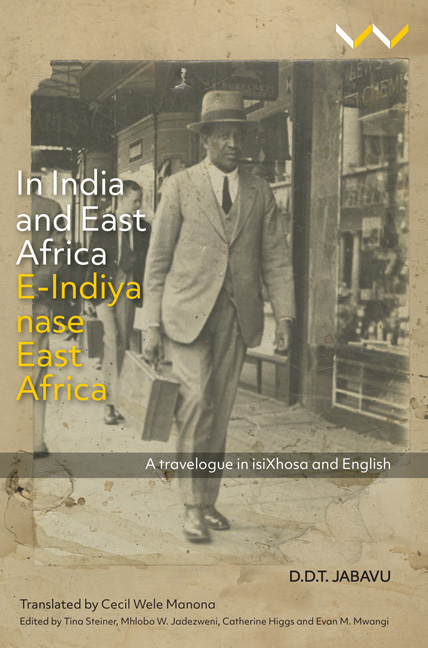Book contents
- Frontmatter
- Contents
- List of Illustrations
- Maps
- Acknowledgements
- Networks of Solidarity: D.D.T. Jabavu’s Voyage to India
- Revisiting D.D.T. Jabavu, 1885–1959
- Notes on the Original and the Translation
- In Praise of Cecil Wele Manona, 1937–2013
- E-Indiya nase East Africa
- In India and East Africa
- Afterword: Jabavu and African Translations for the Future
- References
- Editors’ Biographies
- Index
Chapter 7
Published online by Cambridge University Press: 27 March 2020
- Frontmatter
- Contents
- List of Illustrations
- Maps
- Acknowledgements
- Networks of Solidarity: D.D.T. Jabavu’s Voyage to India
- Revisiting D.D.T. Jabavu, 1885–1959
- Notes on the Original and the Translation
- In Praise of Cecil Wele Manona, 1937–2013
- E-Indiya nase East Africa
- In India and East Africa
- Afterword: Jabavu and African Translations for the Future
- References
- Editors’ Biographies
- Index
Summary
Before I went to India, Rev. J.C. Mvusi from Durban came here to see his daughter who is married to Kigundu. I am told he made it a point to visit Jinja, so that he could see the crocodiles in the River Nile. He waited for a long time, until it was late at night, and eventually he saw them. He must be of the Ngqosini clan that he is so interested in crocodiles.
On Saturday 4 February 1950, my friends were at the station in Kampala to see me off at 10 a.m. It was a pity that we were parting. The train left and we got to Jinja at noon where I was met by the honourable Lubogo, whom I was not able to meet the previous Sunday. He took me from the train and told me that he would take me back to the train via a short route after four hours. By then the train was going to Mbulamuthi in the north, and this would enable me to see his family and another part of the country. He was driving a Limousine, with music inside. He is a man of royal blood of the Soga clan in Uganda and serves as a treasurer in this country. We started by visiting his offices and then we went to his house, which is on a hill (like the home of Mzimba in Alice). His house faces the Victoria Nyanza. Here I was entertained by his family and friends. He has a son who studied under me at Fort Hare and others who were in other colleges. We travelled 60 miles to get back to the train, and we were passing through thick forests with many interesting things. He showed me old sites where courts were held in the past, and these courts were held under huge trees. Headmen are respectable people here, they are neat. Lubogo said there are no underprivileged people in Uganda, because those who have nothing are supported by the chiefs. We visited mission schools and the last place we visited was an Indian Cotton Ginnery where Africans work.
- Type
- Chapter
- Information
- In India and East Africa / E-Indiya Nase East AfricaA Travelogue in isiXhosa and English, pp. 274 - 278Publisher: Wits University PressPrint publication year: 2019



